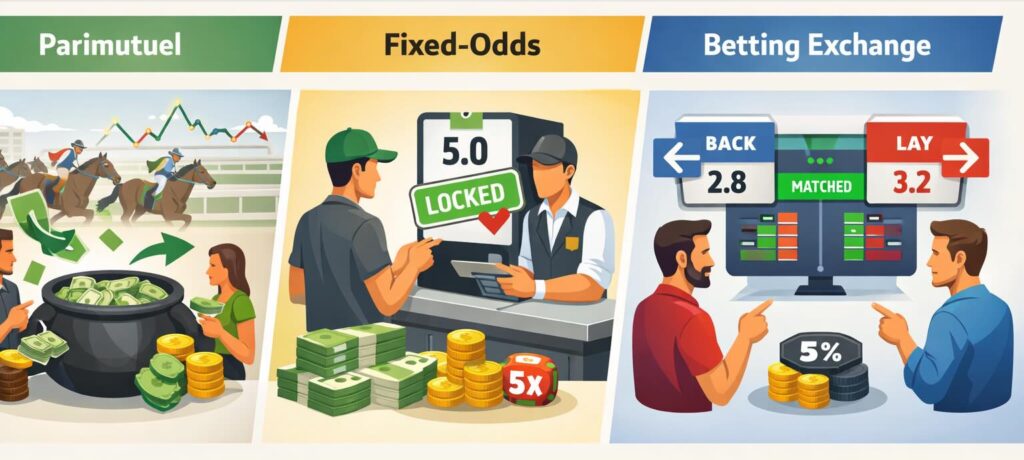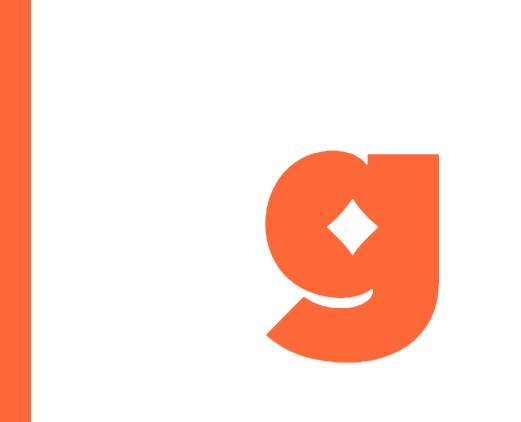Horse racing bet types
So, you are interested in having a wager on horse racing but are new to the game. It can seem like you are attempting to learn a foreign language. All-up bets, trixies, parimutuel odds, quadrellas, yankees … what does it all mean?
Here is the World Gambling List’s explanation of the various bet types. Many of the simpler ones are standard the world over but there are also some bet types offered only in certain countries or regions …
Parimutuel v fixed-odds wagering v exchanges

Before we move on to horse racing bet types, there are two main systems of offering wagering markets: parimutuel (known in some jurisdictions as totalisator betting) and fixed-odds betting. We will explain how each works and also touch on another wagering model: the betting exchange, where participants can “lay” a horse or a sporting team to lose.
Parimutuel is a French word meaning “mutual bet”. Under this type of betting all wagers on a horse race go into a central pool. The betting operator takes out its percentage and the remainder of the pool is split up between winning bets. The final odds are not decided until the race or event starts, when no more money can be added to the pool. This is commonly known as totalisator or tote betting. A key point here is that the wagering operator profits from every race or event. They take their cut from the final pool no matter the outcome.
Fixed-odds betting is different in that a bookie or sportsbook frames a market on a race or event and set odds are available for all runners. The odds will change depending on the flow of bets but under this system it is possible to lock in a price even though your horse may be at much shorter or longer odds when the event begins. The bookmaker can lose under this system though if their book is perfectly balanced they will win regardless of the outcome.
Betting exchanges have grown in popularity since the foundation of Betfair in 2000. Under this model, bets between punters are matched, with the operator taking a smaller cut than a totalisator would. Betfair, for example, takes a 5 per cent cut from net winnings. This is a type of peer-to-peer betting. You can basically choose the odds you desire, though you are reliant on another punter taking the other side in your bet. If no one wishes to take you on, your bet will not be matched and will be voided.
You can learn about betting on horse racing online, in our extensive guide.
Bet types for horse racing
Horse racing bet types vary from country to country, and even state to state in some places. Some of the most common bet types you will find available at horse racing betting sites include:
- Win: The most basic of all horse racing bets. You put your money on a horse to win and if it does, you collect. Simple. Also referred to as betting straight-up or “on the nose”.
- Place: This usually means you are putting your cash on a horse to finish in the first three, though generally if there are fewer than seven runners only the first two placegetters will pay out for the place. Sometimes, too, in big fields in Europe there will be a place dividend for the first four across the line.
* In North America, place bets pay out on only the first two runners over the line. In the U.S. and Canada There is another category, show betting, that pays out on the first three. - Each-way: A combination of win and place betting. If you back a horse each-way, you will be paid out for the win and place if it wins the race, and for the place only if it finishes second or third. So if you had $10 each-way at fixed odds of 4-1 ($5) and it won you would receive $70. If it placed you would get your initial $20 back as fixed place bets usually return quarter odds.
- Across the board: In North America, this is like each-way but covers win, place and show betting. For example, if you have $10 across the board, the wager will cost $30 – $10 each on the win, place and show bets.
Exotic bets
Horse racing exotics bets are a little bit more complicated, and harder to land, but can offer some lucrative payouts. Some of the most common horse racing exotic bets include:
- Quinella: This bet involves trying to select the first two horses over the line, in any order. You are not restricted to picking only two horses though; you can box up as many as you like.
- Exacta: Pick the first two over the line but differs from the quinella in that you must pick them in the correct order. Also known as perfecta and exactor (North America).
- Trifecta (triactor, tierce in Hong Kong). Pick the first three in order over the line, but as with other exotic bets you can include as many runners as you like, you are not restricted to choosing three runners. The more horses you include, the greater the cost of the bet (unless you are using some form of “Flexi-bet”‘ which we will explain below).
- First four: As the name suggests, this pays out if you can select the first four over the line in the correct order. This bet can pay out lottery-like figures, especially for the biggest races on the calendar which have massive betting pools. (Also known as superfecta in North America).
- Duet, Any2 or swinger: Pick two out of three placegetters to collect with this bet, though pools tend to be markedly smaller than for the other exotics. Known as a quinella place in Hong Kong and Japan.
- Flexi-betting: Many wagering operators offer this for exotics and other forms of betting such as trebles and quadrellas. The idea behind it is to allow smaller punters to include multiple runners. For example, for a $1 unit, a box trifecta with six selections would cost $120 but Flexi-betting allows the punter to take it for whatever amount they feel comfortable with. They could invest $12 to take 10 per cent of the bet. If they succeed they would collect 10 per cent of the final dividend declared for a $1 unit.
- Jockey Challenge: Wagering options which allows you to bet on the most successful jockey at a race meeting, or series of races. Originated in Hong Kong.
Multi-race bets
Multi-race bets are when your wager runs across multiple races, with these including things like the Daily Double and the Quadrella.
- Double: Pick the winners of two races set by the totalisator operator. A running double involves picking the winner of two consecutive races on the same card.
- Treble: Pick the winners of three set races. Also called a triple or a pick three.
- Quadrellas: Pick the winners of four set races.
- Pick 6 or Big 6: Pick the winner of six set races. This bet type has occasionally paid out in the seven figures, as it should. Finding six winners on the trot, even with multiple runners in each leg, is near impossible even for the professionals.
- Note: These multi-race bets may not be available in all betting jurisdictions and there are many variations. Ireland, for example, has the Jackpot, a pick four on races three to six at each meeting, plus a pick six on races one to six at a Sunday meeting.

All-up or accumulator betting
Also known as a parlay and a roll-up bet or combination bet.
Another form of multi-race betting, with the difference here being that you can choose your own races and meetings, you do not have to stick to set races. In fact, most betting operators allow you to bracket horses from different meetings.
When you begin adding horses to an accumulator, it’s easy to be distracted by the phone-number-like figures that you can collect with, for example, four straight winners. The World Gambling List suggests employing a trixie or a Yankee or the like, so you do not need all legs of your bet to win to collect some cash.
- All-ups: You pick a certain number of horses, and if the first horse wins, all the winnings roll over on to the next one, and so on. However, miss one leg and you are out of business. You can also have an all-up place bet, meaning your runners need only run a place for you to stay alive, though obviously the pay-off will not be as rewarding as for a win all-up.
- Trixie: Pick three runners and combine them in four possible bets, so you need two of them to win to have a collect. Your four bets are a treble (horse one into horse two into horse three) and three doubles (one x two, one x three, two x three).
- Yankee: Four runners with 11 combinations: one four-horse all-up (horses 1-2-3-4), four trebles (1-2-3, 1-2-4, 1-3-4, 2-3-4) and six doubles (1-2, 1-3, 1-4, 2-3, 2-4, 3-4).
Of course, there are many more variations on this theme. Here are just a few: Super Yankee (five runners, 26 combinations), Heinz (six runners, 57 combinations), Super Heinz (seven runners, 120 combinations), Goliath (eight runners, 247 combinations).
Though your correspondent must confess that in 30-odd years of wagering, we have never gone past the Yankee on this list … We just don’t think we could be luckier (or more skilful) than finding four in a row.
Bet types unique to countries/regions
- U.S./Canada: Place pick 9: To win this monster bet, your selections must finish first or second in nine races.
- Australia: Same race multis are one bet that have taken off in huge proportions in Australia. Paying huge, these racing bet types allow you to wager on multiple outcomes in the same race. For instance, back a horse to finish in the top three, and another to finish in the top four. Most Australian betting sites feature some form of same race multis these days. Mystery trifectas and quinellas are also very popular around Melbourne Cup time.
- Britain: Scoop 6: Six races …. Find the winners and collect the big prize but there is also a place fund where you simply need six placed horses in the selected races.
- Hong Kong: Double trio: Select the first three over the line in any order in two selected races.
- Triple trio: Select the first three over the line in any order in three selected horse races. There is a consolation for getting the first two races right.




